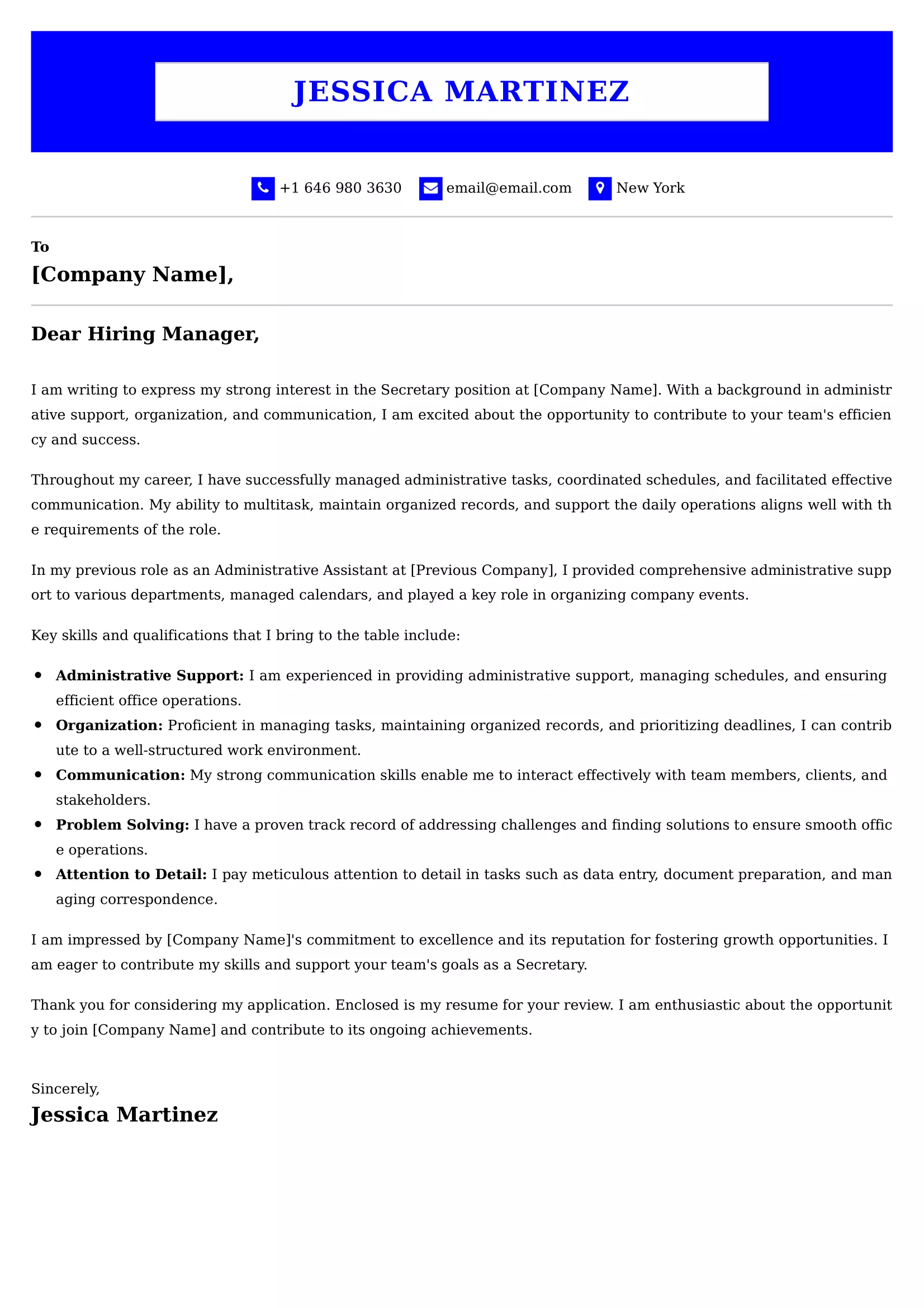Cover Letter
Cover Letter examples for top Anesthesia Technician jobs
Use the following guidelines and Cover Letter examples to choose the best Cover Letter format.
Anesthesia Technician Cover Letter Sample

About Anesthesia Technician Cover Letters
Welcome to our Anesthesia Technician Cover Letter Examples page! Crafting a compelling cover letter is essential when applying for an Anesthesia Technician position. Your cover letter should effectively highlight your skills, experience, and dedication to providing safe and efficient anesthesia support. Here, you'll find comprehensive information on salary details, key skills, current trends, and professional tips to help you compose an outstanding Anesthesia Technician cover letter.
Salary Details for Anesthesia Technicians
Anesthesia Technician salaries in Canada can vary based on factors such as location, experience, and healthcare facility. On average, Anesthesia Technicians can expect an annual salary ranging from $40,000 to $60,000 or more, depending on qualifications and location.
Key Skills for an Anesthesia Technician Cover Letter
When writing your Anesthesia Technician cover letter, make sure to emphasize the following key skills:
- Anesthesia Equipment Operation: Highlight your proficiency in setting up, maintaining, and troubleshooting anesthesia machines and equipment.
- Patient Care: Showcase your dedication to patient safety and comfort during anesthesia induction and recovery.
- Sterilization Procedures: Discuss your knowledge of sterilization techniques for anesthesia instruments and supplies.
- Team Collaboration: Emphasize your ability to work effectively with anesthesiologists, surgeons, and other healthcare professionals.
- Emergency Response: Mention your readiness to assist during anesthesia emergencies and your knowledge of emergency procedures.
Current Trends in Anesthesia Technician Cover Letters
Stay current with these trends to make your Anesthesia Technician cover letter stand out:
- Patient-Centered Care: Highlight your commitment to patient-centered care, focusing on comfort and safety throughout the anesthesia process.
- Technology Integration: Discuss your familiarity with electronic health records (EHR) and anesthesia information management systems (AIMS).
- Infection Control: Emphasize your knowledge of infection control practices, especially in light of the COVID-19 pandemic.
- Certification: If you hold relevant certifications (e.g., Certified Anesthesia Technician, CET), include them to demonstrate your qualifications.
- Continuing Education: Mention any recent courses, workshops, or training you've completed to stay up-to-date in the field.
Professional Tips for Writing an Anesthesia Technician Cover Letter
To create an effective cover letter:
- Customize it: Tailor your cover letter for each job application to address the specific requirements of the role and healthcare facility.
- Highlight Achievements: Share examples of how you've contributed to efficient anesthesia services and patient care in previous positions.
- Show Enthusiasm: Express genuine interest in the healthcare facility and the Anesthesia Technician position by researching the organization.
- Conciseness Matters: Keep your cover letter concise, typically one page or less, to maintain the reader's interest.
- Proofread Carefully: Eliminate any typos or grammatical errors to present yourself as detail-oriented and professional.
Frequently Asked Questions (FAQs)
- Q: Is it essential to include references in my Anesthesia Technician cover letter?
- A: It's not necessary to include references in the cover letter; provide them when requested.
- Q: How do I address my cover letter if I don't know the hiring manager's name?
- A: Use a generic salutation like "Dear Hiring Manager" or "To Whom It May Concern."
- Q: What's the ideal tone for an Anesthesia Technician cover letter?
- A: Maintain a professional and compassionate tone, emphasizing your commitment to patient care and safety.
- Q: Should I include my certifications in the cover letter?
- A: Yes, include relevant certifications to demonstrate your qualifications and commitment to professional development.
- Q: How can I address a career gap in my cover letter?
- A: Address career gaps honestly but positively, focusing on any skills or experiences gained during that time.
More Resume Examples for the Next Step in Your Anesthesia Technician Resume Career jobs
- Anesthesia Technician Resume
- Clinical Director Resume
- Dialysis Technician Resume
- Doctor Resume
- Ekg Technician Resume
- Hospital Volunteer Resume
- Intensive Care Physician Resume
- Medical Coding Specialist Resume
- Medical Records Specialist Resume
- Certified Lactation Consultant Resume
- Nuclear Medicine Technologist Resume
- Optometrist Resume
- Pediatrician Resume
- Physician Assistant Resume
- Registered Mri Technologist Resume
- Speech Language Pathologist Resume
- Ultrasound Technician Resume
More Cover Examples for the Next Step in Your Anesthesia Technician Cover Career jobs
- Anesthesia Technician Cover Letter
- Clinical Director Cover Letter
- Dialysis Technician Cover Letter
- Doctor Cover Letter
- Ekg Technician Cover Letter
- Hospital Volunteer Cover Letter
- Intensive Care Physician Cover Letter
- Medical Coding Specialist Cover Letter
- Medical Records Specialist Cover Letter
- Certified Lactation Consultant Cover Letter
- Nuclear Medicine Technologist Cover Letter
- Optometrist Cover Letter
- Pediatrician Cover Letter
- Physician Assistant Cover Letter
- Registered Mri Technologist Cover Letter
- Speech Language Pathologist Cover Letter
- Ultrasound Technician Cover Letter
Get started with a winning Cover Letter template
Cover Letter Magic: Expert Examples to Make Your Words Shine!
Step into the world of "Cover Letter Magic." Here, you'll find a treasure trove of expertly crafted 700+ cover letter examples that will help your words shine. These examples are like a special guide that shows you how to write amazing cover letters. They cover all kinds of jobs and situations, and each one has been checked by an expert who knows all about cover letters.
Cover Letter Examples
See what our customers says
Our Cover Letter Are Shortlisted By










